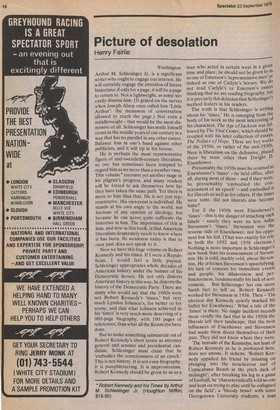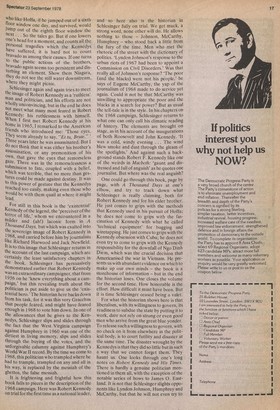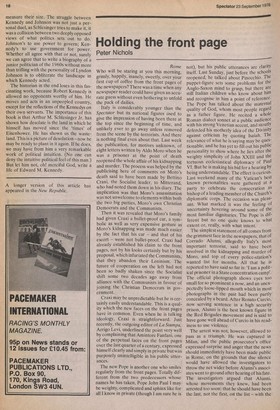Picture of desolation
Henry Fairlie
Washington Arthur M. Schlesinger Jr. is a significant writer who ought to engage our interest. He will certainly engage the attention of future historians: if only for a page, it will be a page to return to. Not a lightweight, as some too easily dismiss him. (It grated on the nerves when Joseph Alsop once called him 'Little Arthur': the meanness of conversation allowed to reach the page.) Not even a middleweight — that would be the most dismissive of all. Schlesinger has made himself count in the middle years of our century in a way that has no parallel in any other career. Balance him in one's hand against other publicists, and it will tip in his favour.
He is perhaps the most representative figure of mid-twentieth-century liberalism, so one has sometimes been tempted to regard him as no more than a weather vane. This volume* recounts yet another stage in his pilgrim's progress, and many readers will be forced to ask themselves how far they have taken the same path. Yet there is more to him than that. He is not just rep resentative. His viewpoint is individual. He stands at his own angle to the world, not because of any opinion or ideology, bui because he can never quite suffocate the historian in him. The importance of this in him, and now in this book, is that American liberalism desperately needs to know where it has been. Its weakness today is that its own past does not speak to it.
Now we have this huge volume on Robert Kennedy and his times. If I were a Republican, I would feel a little piqued. Schlesinger appropriates whole decades of American history under the banner of his Democratic heroes. He not only distorts American history in this way, he distorts the history of the Democratic Party. There are many who would say that the 1960s were not Robert Kennedy's 'times,' but very much Lyndon Johnson's, for better or for worse, and that what Johnson achieved in his 'times' is very much more deserving of a 900-page biography, with 100 pages of references, than what all the Kennedys have done.
But to make something substantial out of Robert Kennedy's short terms as attorney general and senator and presidential candidate, Schlesinger must claim that he 'embodies the consciousness of an epoch.' This is not history. It is not even biography. It is pamphleteering. It is impressionism. Robert Kennedy should be given to us as a man who acted in certain ways in a given time and place; he should not be given to us as one of Emerson's 'representative men or indeed as one of Carlyle's heroes. We do not read Carlyle's or Emerson's essays thinking that we are reading biography, but it is precisely this delusion that Schlesinger s method fosters in his readers.
The truth is that Schlesinger is writing about his 'times.' He is emerging from the body of his work as the most interesting of his characters. The Age of Jackson was followed by The Vital Center, which should be coupled with his later collection of essays, The Polities of Hope. These are key works of the 1950s, or rather of the anti-1950s. Here is liberalism on the defensive, placed there by none other than Dwight D. Eisenhower.
Presumably the 1950s must be counted as Eisenhower's 'times' — he held office, after all, during most of them — and if they were, he presumably 'embodied the con.sciousness of an epoch' — and embodied it for liberals as well as for others. If the times were tame, did not liberals also become tame? For if the 1950s were Eisenhower's 'times' — this is the danger of attaching such. labels — surely they were no less Adlai Stevenson's 'times.' Stevenson was the reverse side of Eisenhower, not his onP°nent but his foil. (That was exactly his role in both the 1952 and 1956 elections.) Nothing is more important in Schlesinger 's new book than his reassessment of Stevenson. He is cold, starkly cold, about Stevenson. He criticises Stevenson's speechifying, his lack of concern for immediate events and people, his dilatoriness and perfunctoriness, fundamentally his lack of seriousness. But Schlesinger has one more harsh fact to tell us. Robert Kennedy worked for Stevenson in 1956. Then election day Kennedy quietly marked his ballot for Eisenhower.' What a tale of the 'times' is there. No single incident records more vividly the fact that in the 1950s the liberals left their landscape, that the twin influences of Eisenhower and Stevenson had made them divest themselves of their past. They did not know where they were.
The bravado of the Kennedys, not least of Robert Kennedy as he is portrayed here, does not amuse. It sickens. 'Robert Kennedy appalled his friend by insisting on plunging into the treacherous surf of Copacabana Beach in the pitch dark of midnight'; after breaking his leg in a game of football, he 'characteristically told no one and kept on trying to play until he collapsed on the field'; a 'bloody brawl' with some Georgetown University students; a man who like Hoffa, if he jumped out of a sixth floor window one day, and survived, would Jump out of the eighth floor window the next. . . So the tales go. But if one lowers one's head for a moment, and counts all the Personal tragedies which the Kennedys have suffered, it is hard not to count bravado as among their causes. If one turns to the public actions of the brothers, bravado again seems too persistent and disturbing an element. Show them Niagara, they do not see the still water downstream, Where they might picnic. Schlesinger again and again tries to meet the image of Robert Kennedy as a 'ruthless' man and politician, and his efforts are not Wholly unconvincing, but in the end he does not meet what many most feared in Robert Kennedy: his ruthlessness with himself. When I first met Robert Kennedy at his home in 1965, I remarked to the American friends who introduced me: 'Those eyes. They seem already to say, "Et tu, Brute." Three years later he was assassinated. But I do not think that it was either his brother's assassination, or any premonition of his own, that gave the eyes that remorseless gaze. There was in the remorselessness a submission to fate, coupled with a belief, Which was terrible, that no more than gestures could be made against destiny. It was to this power of gesture that the Kennedys reached too easily, making even those who would be with them quail at where it might lead.
For still in this book is the 'existential' Kennedy of the legend, the 'perceiver of the terror of life,' whom we encountered in a milder and (ah!) laconic form in A Thousand Days, but which was exalted into the sovereign image of Robert Kennedy in 1968, and carried before him by journalists like Richard Harwood and Jack Newfield. It is to this image that Schlesinger returns in the account of the last campaign, which are certainly the least satisfactory chapters in the book. Schlesinger has persuasively demonstrated earlier that Robert Kennedy was an extraordinary campaigner, that from 1956 on he 'knew everything about a campaign,' but this revealing truth about the Politician is put aside to give us the 'existential hero.' The historian here backs down from his task, for it was this very Gracchus that people feared, and might have feared enough in 1968 to vote him down. In one of the allowances that he gives to the Kennedys, Schlesinger slips and slides through the fact that the West Virginia campaign against Humphrey in 1960 was one of the dirtiest in living memory, slips and slides through the buying of the votes, and the unforgivable calumny against Humphrey's World War II record. By the time we come to 1968, this politician who trampled where he had to trample, trampled on any and all in his way, is replaced by the messiah of the ghettos, the false messiah.
It is frightening and frightful how this book falls to pieces in the description of the 1968 campaign. Here was Robert Kennedy on trial for the first time as a national leader, and so here also is the historian in Schlesinger fully on trial. We get muck, a strong word, none other will do. He allows nothing to those — Johnson, McCarthy, Humphrey — who stood back a little from the fury of the time. Men who met the rhetoric of the street with the dictionary of politics. 'Lyndon Johnson's response to the urban riots of 1967 had been to appoint a Commission on Civil Disorders.' Was that really all of Johnson's response? 'The poor (and the blacks) were not his people,' he says of Eugene McCarthy, the yap of the journalism of 1968 made to do service yet again. Could it not be that McCarthy was unwilling to appropriate the poor and the blacks in a search for power? But as usual the tell-tale is in the style. In his chapters on the 1968 campaign, Schlesinger returns to what one can only call his climatic reading of history. The elements are brought on stage, as in his account of the inaugurations of both Roosevelt and John Kennedy. 'It was a cold, windy evening . . . The wind blew smoke and dust through the gleam of the spotlights.' And against such a background stands Robert F. Kennedy like one of the weirds in Macbeth: 'gaunt and distressed and full of anguish' as he quotes one journalist. But where was the real anguish?
One could go through this book, page by page, with A Thousand Days at one's elbow, and try to track down what Schlesinger is really claiming, both for Robert Kennedy and for his elder brother. He just comes to grips with the methods that Kennedy used in his pursuit of Hoffa; he does not come to grips with the fascination of Kennedy with what he called 'technical equipment' for bugging and wiretapping. He just comes to grips with the Kennedy obsession with Cuba; he does not even try to come to grips with the Kennedy responsibility for the downfall of Ngo Dinh Diem, which was the crucial decision that Americanised the war in Vietnam. He presents us with abundant evidence on which to make up our own minds — the book is a storehouse of information — but in the end the historian loses. One closes the volume for the second time. How honorable is the effort. How difficult it must have been. But it is time Schlesinger ceased being a valet.
For what the historian shows here is that liberalism, with its willingness to govern, its readiness to subdue the state by putting it to work, dare not rely on strong or even good men who arrive from the great blue yonder. To release such a willingness to govern, with no check on it from elsewhere in the political body, is to court futility and disaster at the same time. The disaster wrought by the Kennedys is that they did so little but in such a way that we cannot forget them. They haunt us. One looks through one's long notes on Robert Kennedy and His Times. There is hardly a genuine politician mentioned in them all, with the exception of the notable series of bows to James 0. Eastland. It is not that Schlesinger slights opponents like Lyndon Johnson, Humphrey and McCarthy, but that he will not even try to measure their size. The struggle between Kennedy and Johnson was not just a personal duel, as Schlesinger tries to make it, it was a collision between two deeply opposed views of what politics sets out to do. Johnson's to use power to govern; Kennedy's to use government for power. Whether all agree with that or not, surely we can agree that to write a biography of a junior politician of the 1960s without more than trifling with the personality of Lyndon Johnson is to obliterate the landscape in which Kennedy acted.
The historian in the end loses in this fascinating work, because Robert Kennedy is allowed no opponents worthy of him. He moves and acts in an unpeopled country, except for the reflections of the Kennedys on their own servants. The importance of this book is that Arthur M. Schlesinger Jr. has .shown how desolate is the land in which he himself has moved since the 'times' of Eisenhower. He has shown us the wasteland. This is a picture of desolation —now he may be ready to plant in it again. If he does, we may have from him a very remarkable work of political intuition. (No one can deny the intuitive political feel of this man.) But let him not, oh! merciful God, write a life of Edward M. Kennedy.
A longer version of this article has appeared in the New Republic.




































































































 Previous page
Previous page